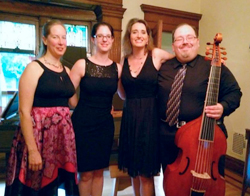by Nicholas Jones

Burning River Baroque is the brainchild of harpsichordist Paula Maust and multi-instrumentalist Malina Rauschenfels (singer and cellist — and in this program, making what I believe is her debut on the Baroque violin). Their scholarly research brings with it no trace of academic fussiness. Joined here by guest artists Phillip Serna on viola da gamba and soprano Josefien Stoppelenburg, the group gives each work, regardless of fame, its particular brand of beguiling inventiveness and compelling passion.
My personal favorite was Occhi superbi, a duet for two sopranos and continuo by the 17th-century Venetian Barbara Strozzi, full of the lush and dramatic dissonances and suspensions that the Italian madrigalists revelled in. Rauschenfels and Stoppelenburg, whose very different voices blended beautifully, made the most of the multiple emotions in this song about love gone wrong. The music is great, but so are the words, and the two sopranos clearly loved giving us crunchy phrases like scongiuro un sasso — “I’m pleading with a stone!”
While Strozzi is now moderately well-known amongst Baroque performers and listeners, less familiar names on the program tell of the ongoing neglect of women composers. Isabella Leonarda was a cloistered nun, but you would not guess it from the spirited militarism of her extended piece, Ad arma, which represents the church in battle against its enemies.
Another 17th-century Italian composing nun was Chiara Margarita Cozzolani, represented here by a startlingly vivid and varied duet calling on the Virgin for help in the midst of a storm at sea. Whether it tells of a real storm or is (more probably) an allegory about the soul or the church in the face of persecutions, the music vividly conveys the terror of the experience, as well as the relief when winds and waves subside.
A cantata by the French harpsichordist and composer Élizabeth Jacquet de la Guerre was the most fully developed piece on the program, an ambitious set of recitatives and arias on the Old Testament story of Jephthah, the general who won the battle by making a vow to sacrifice the first being he encountered on his return home. In a bitter turn of fate, his own daughter becomes the price of his victory. De la Guerre composed this strange story in an equally strange and curiously compelling way, combining over-the-top emotionalism with submissive morality (“If the Heavens want our life, / Let’s offer it without difficulty”).
A more secular side to the program presented the French composer Julie Pinel. Her music ought to be better known, judging from two beautiful songs from her 1737 collection of Serious and Drinking Songs, both of them tender love songs with a delicate shading that reminds me of the paintings of Watteau.
This glimpse into women composers of the Baroque period suggests there’s a good deal still to be explored, and I look forward to hearing more from Burning River in this vein. In this concert, the Baroque offerings were supplemented by composers from other periods, Medieval (the well-known Hildegard von Bingen, represented by a lovely opening chant) and contemporary (Phillip Serna played several pieces for solo viola da gamba by Atlanta composer Martha Bishop). Both of these time-line extensions, while nicely done, were less convincing than the Baroque pieces. So different stylistically, they were hard to integrate with the more florid 17th-century music. A couple of selections of Baroque music for solo harpsichord by women might be a welcome addition in future programs of this nature.
Saturday evening’s audience was treated to an encore, Strozzi’s wonderful I Baci, which ends knowingly in the inevitable rhyme of baci — “kisses” — and taci — “don’t tell!”
Published on ClevelandClassical.com September 20, 2016.
Click here for a printable copy of this article



